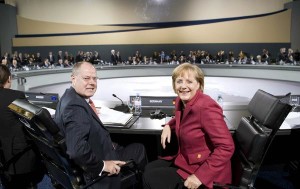
For Europe it went well. The German elections yesterday clearly blocked the most Eurosceptic forces or openly anti-European, like the liberals and Alternative for Germany. The FDP (Free Democratic Party) didn’t even make it into the Bundestag and it is the first time since 1945, while the new party of professors didn’t make it on the first try even though they obtained a good result. And if it is probably true that the liberals are out also because of the AFD (Alternative for Germany party), who collected the most “right-wing” votes, it is also true that the constituents chose a more European vote: adding those votes perhaps there is still a large 5% compared to the results just of liberals in 2009.
That the constituents’ choice was pro-European can be whispered, it is difficult to understand precisely how much Angela Merkel’s European policies have weighed on the German’s choices and above all how much they have done in relation to domestic issues, where clearly the choices were awarded to the Chancellor. And certainly Europe counted more than usual this time, being that Germany was directly involved with its money in the bailout policies of countries like Greece and Portugal. The voters however said yes, these countries need to be helped and it was right to allow them to stay in the Euro. The price one will say, rightly so, was high but the German citizens also could have said so instead they were too easy, and voted for AFD. They didn’t do it; they “super,” as she herself said, awarded Merkel and contented the dismal Social Democrats, giving them 2.5 points more.
Certainly the Greens, Europeanists, were punished but it seems that Merkel’s autonomous choice to get out of the nuclear arena has weakened their positions. At the end of the day, it seems that the German Chancellor, the Polish Donald Tusk, the Luxembourger Jean-Claude Juncker (who has now resigned but for reasons not related to the crisis) are the only European Heads of Government to have passed the economic crisis unscathed.
Now the numbers and sentiment of Germans indicates that they are headed toward a coalition between CDU-SCU (Christian Democrat and Social Christian Union) and SDP (Social Democratic Party). Even this time, the third, Merkel didn’t win alone and in fact, will have to align with her “natural” adversaries. She had many votes but like a praying mantis killed her liberal allies (which in reality she really didn’t like very much), as she already did between 2005 and 2009 with the Social Democrats, who now are struggling to get back on their feet.
For Europe the new alliance could be a good combination. Obviously the tough Wolfgang Schaeuble will remain Finance Minister but if an agreement is made (and that won’t be so easy), traditionally Foreign Minister are in the minority party and thus in the Social Democrats. There will be no revolution, not even a jolt, but we can probably hope for some more openings in the Council.


![[foto: European Institute for Gender Equality]](https://www.eunews.it/wp-content/uploads/2021/03/gender-pay-gap.jpg)


![[foto: imagoeconomica]](https://www.eunews.it/wp-content/uploads/2024/08/pnrr-meloni-350x250.png)



